Chess got me into the boardroom - Dr. Eng. Naimanye
"Chess is better than mathematics. Ultimately, chess teaches life skills and patience. This is important," says Dr. Eng. Andrew G. Naimanye, who holds the highest chess rating not only in Uganda, but also in East and Central Africa.
THE BIG INTERVIEW
It is 29 years since Dr. Eng. Andrew G. Naimanye, who has FIDE Master status, attained the highest chess rating in East and Central Africa. He was recently appointed the Acting Executive Director of Uganda Road Fund (URF). He spoke to the New Vision's SAMUEL SANYA about his chess journey and how the sport has impacted his life and career.

Q. Who is Dr. Eng. Andrew Grace Naimanye?
Well, Dr. Eng. Andrew Naimanye is a civil engineer by training. I studied at King's College Budo for both ‘Ordinary' and ‘Advanced' levels. I finished top of the class at both levels. I was in Nigeria House.
I then went to the University of Leeds in the UK for a degree in civil engineering, after which I did a Master's degree in transport planning and engineering. I also completed a doctorate in transport economics; all studies were undertaken at the University of Leeds.
I played board one for King's College Budo at the first ever Fr. Grimes Junior Chess Championship that was held in 1989, where all chess-playing schools went to Namasagali College to play. I got the highest points of all board ones at that tournament.
Prof. Dr. Umar Kakumba, the Deputy Vice Chancellor for Academic Affairs at Makerere University, was one of the people I played against at that tournament in the last round to determine the national junior chess champion.
When I excelled for Budo at the tournament, I had to represent Uganda at the second Africa Junior Chess Championships in Surulere, Lagos, Nigeria in July 1989. I won a bronze medal for Uganda. That was one of the first international chess medals in Uganda and the first at King's College Budo.
The following year, I won the Pan Paper Open in Nairobi, Kenya. By 1990, I was the national chess champion. I was in Senior Five and I competed with the late Willy Zabasajja and others at the time.
And by 1990, I was holding the highest chess rating in East and Central Africa - that is 2360. After the Pan Paper Open, I proceeded to the third Africa Junior Chess championships in Botswana, where I was one of the top four.
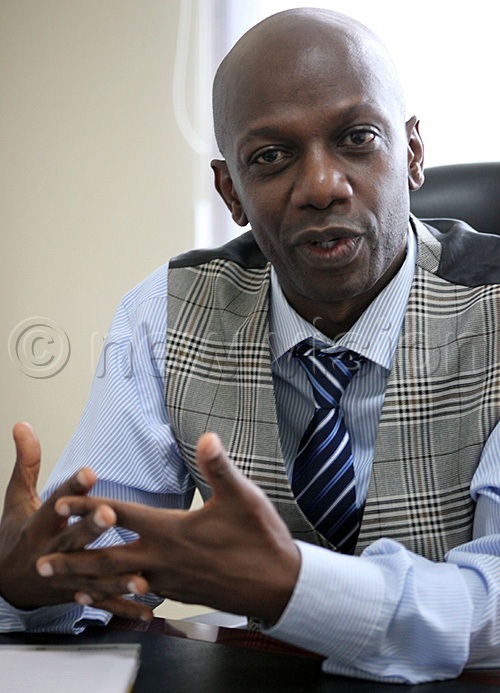 Naimanye won a junior bronze medal for Uganda in Nigeria in 1989. (Credit: Samuel Sanya
Naimanye won a junior bronze medal for Uganda in Nigeria in 1989. (Credit: Samuel Sanya
Later on in 1991, I was the team captain for the Uganda chess team at the World Chess Olympiad in Manilla, Philippines. I played board one for Uganda. While in the UK, I played for the University of Leeds and also Alwoodley Chess Club.
Chess is a good skill that has been helpful for me at school and in my work life. Through chess, you are able to plan ahead, to think ahead and the chess skills can be transferred to the boardroom.
I recommend chess because it's a good tool for improving your analytical skills. Chess players tend to be good at both mathematics and also in the arts subjects. Chess has many benefits in improving someone's mind in planning and other various aspects of life.
Obviously through God's blessing, I have come so far. But playing chess has been very beneficial to me; the skills I use on chessboard are the same skills I apply in real life.
Chess is a good teaching tool for children. In Azerbaijan and Russia, school children are required to play chess for a certain number of hours every week; it's like Physical Education, but one for the mind.
Q. Who introduced you to chess?
Professor John Ssebuwufu, the current chancellor of Kisubi University, returned from a trip to Australia with a chess board. His son, my classmate in Budo in 1985, came with the chess board to Nigeria House.
I was not physically strong enough to play rugby or football, so I focused on chess, which I felt was interesting. So Ssebuwufu Jr. taught me about the chess pieces, which I took very seriously. When I went back for holidays, my father bought me my first chess board and some chess books.
My father played a big role in encouraging me to play chess. I remember the late Paul Bitarabeho (founding chairman of the Uganda Chess Federation) used to pick me from school and take me to his shop on Nkrumah Road to play chess.
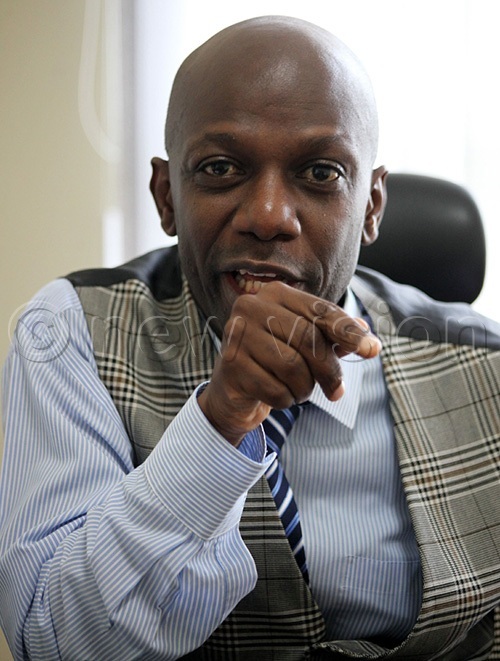 Naimanye feels chess is a good tool for improving one's analytical skills. (Credit: Samuel Sanya
Naimanye feels chess is a good tool for improving one's analytical skills. (Credit: Samuel Sanya
Q. What inspired your interest in chess?
It was a good way to kill time. There was no DSTV at the time and we were not watching the English Premier League. When some people were thinking of going to discos or night clubs, I always preferred to occupy my time with chess.
I studied chess as a subject, the way you do mathematics, physics, chemistry and biology, right from the theoretical principles such as the opening, middle game, and the end game. I taught myself just as a subject; and dedicated at least three hours every week to studying chess theory.
Q. How did chess get you into the University of Leeds?
It was not directly connected to chess, but it was through chess that I was exposed to the outside world at an early age and I got interested in scholarships in the UK.
And through those chess connections and the intelligence that chess taught, I realized that I wanted to be a civil engineer and a chartered one at that. I then applied. The principle the UK Institution of Civil Engineers was using to offer scholarships was that they were looking for someone who has excelled academically and who is going to be a future leader. I was the first Ugandan to be awarded the Queens Jubilee Scholarship of the UK Institution of Civil Engineers.
By me saying that I was the national chess champion, the UK Government through the Institution of Civil Engineers saw that I was a future leader. So I got a partial scholarship from the Institution of Civil Engineers and a partial scholarship from the University of Leeds.
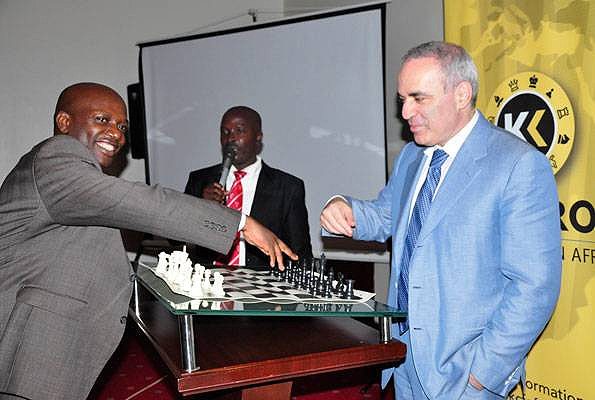 Andrew Naimanye takes on Grand Master Garry Kasparov in Kampala
Andrew Naimanye takes on Grand Master Garry Kasparov in Kampala
Q. How different was playing chess in the UK compared with Uganda?
Here (in Uganda), the external pressures are so many. At that time, the Ugandan economy was not doing very well and there was less time to sit down and think. The economic situation in the UK was much better and the stress levels were less.
Once chess got me to the UK, the chess mind recalibrated and that it was then time to concentrate on my studies. I played a tournament in 1992 in London, where I did not do so well - so I chose to stick to my books and then play chess for leisure.
I was in the UK for 20 years and I became a (dual) Ugandan-UK citizen. I worked as a civil engineer, and I rose to the rank of director at Waterman Group. Chess gave me the confidence to work my way through the UK system despite the subtle racism.
Q. If you were not playing chess, what other sport would you be playing?
I would play scrabble. It is a game that would suit my intellectual power because it seems that I am genetically predisposed to problem solving or mathematical thinking. My father is an electrical engineer and I am a civil engineer.
I sometimes used to go with my father to the Uganda Electricity Board, where he was working, and he exposed me to the world of engineering at a very young age. Through that, I got keen interest in engineering and mathematical thinking.
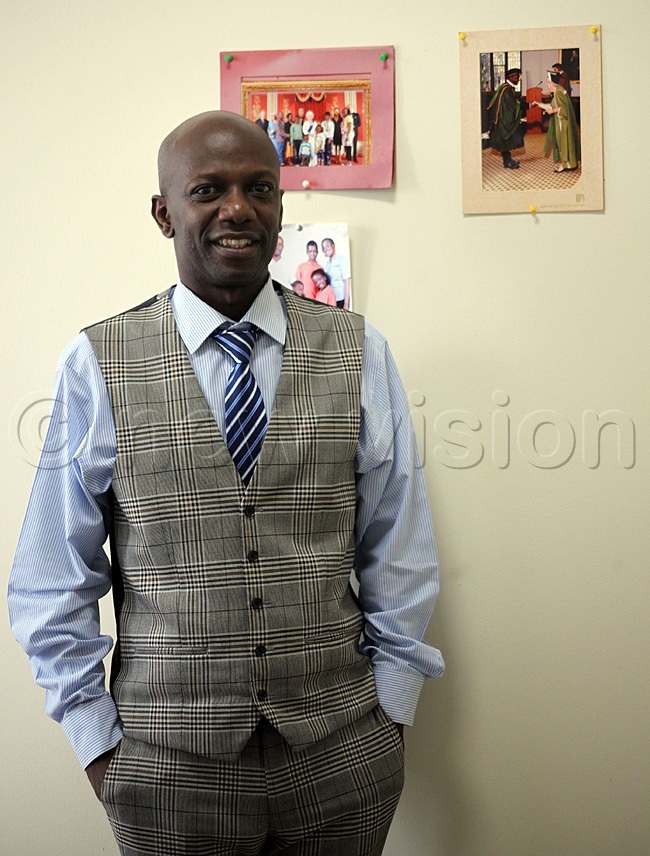 Chess gave Naimanye the confidence to work his way through the UK system. (Credit: Samuel Sanya)
Chess gave Naimanye the confidence to work his way through the UK system. (Credit: Samuel Sanya)
Q. You still hold the highest chess rating. What does it mean to you?
I am proud to hold the highest chess rating not only in Uganda, but also in East and Central Africa. I hold the title of Chess FIDE Master. Whilst I don't play competitive chess anymore, I set the standard and it is up to others to try and beat it. I secured the rating at the Pan Paper Open in Nairobi when I was 18 years old and I realized that maintaining the rating would be a challenge.
It was through chess that I travelled to several places - Kenya, Ethiopia, Nigeria, Botswana, Bombay, Hong Kong, the Philippines - very few people were flying in Uganda at the time. I was 15 or 16 when I first travelled. The Kenya Open in 1988 was the first international chess championship I travelled for.
My three children all play chess at a reasonably good level, although they are not as keen as I was because they have many distractions. I exposed them to the game, and slowly their interest in the game in growing.
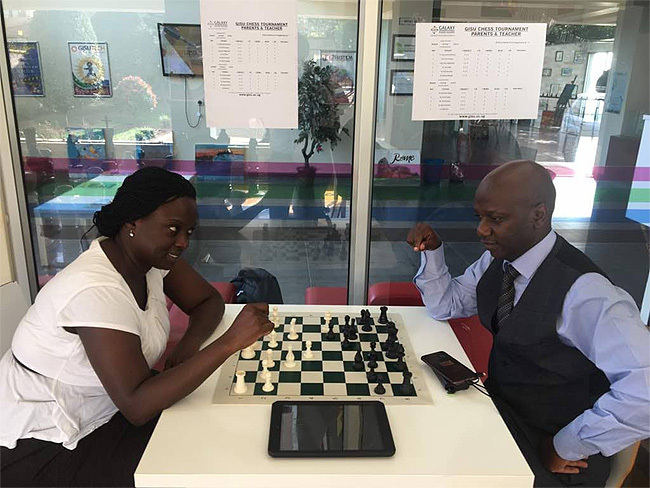 Playing chess at a Galaxy international Parents vs Teachers tournament
Playing chess at a Galaxy international Parents vs Teachers tournament
Q. After nearly 30 years, we haven't yet topped your rating and Uganda is yet to get a Grand Master. What are your thoughts on this?
Well, right now children in school are more exposed to chess than during our time. Chess is no longer a novelty; it has been demystified. Chess is played in almost all top schools. I know that in Budo, there is a chess room. It is possible to get a Grand Master, but that requires commitment; someone has got to make chess their A to Z without distractions, which is difficult.
Being a Grand Master now is not easy. During our time, people were not very exposed, even internationally. But now with computers, someone can go through all your previous games and analyze them with computer tools. By the time you play someone, they know your next moves, so it is a lot harder now.
The calibre of competition is much higher and people are also playing from a much younger age. I was exposed to chess at 14 years. These days, people start playing as early as the age of four.
At the same time, the distractions are many. These are some of the challenges. We need more chess tournaments. Although I was at school, I was able to combine sports and academics because I was national champion and still be top of my PCM (physics, chemistry and mathematics) class - that is very rare.
Schools can play a big role in this push for a Grand Master by creating an enabling environment. Budo sponsored us to play at the first Fr. Grimes Junior Chess Championship in Namasagali but also when we won, we were recognized at the general assembly. So that would encourage others.
I think that chess should be learnt up to a level where you can apply/transfer the skills and not necessarily become a Grand Master. I think that the Chess Parents and Guardians Association (CPGA) is a good initiative. Let as many people as possible get exposed to chess.
Chess is better than mathematics. Ultimately, chess teaches life skills. This is important. Chess teaches patience. It has been 10 years since I came back to Uganda and I think chess skills are very important in corporate governance.
The same skills and strategies you need on the chess board are replicable in the boardroom.